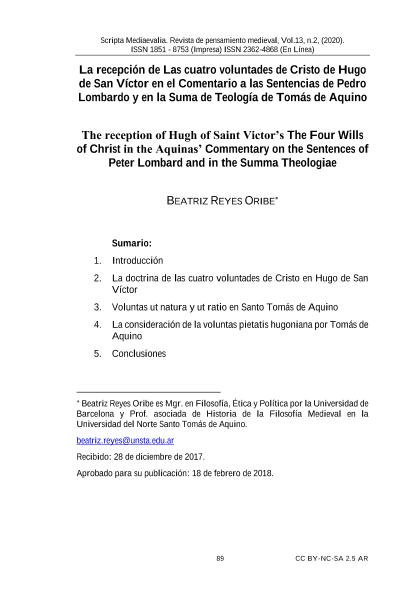Artículo
Hugo de San Víctor escribe en su opúsculo Sobre las cuatro voluntades de Cristo que, dada la doble naturaleza del Señor, encontraremos en Él dos voluntades: la divina y la humana. Pero, aunque la voluntad divina es simple, la humana se presenta reflejando la complejidad de su naturaleza. De ahí que Hugo distingue en Cristo cuatro voluntades: la divina, la humana racional, la carnal y la voluntad de piedad –voluntas pietatis–. Es esta última la que aparece citada por el Aquinate en su Comentario a las Sentencias y en la Tercera Parte de la Suma de Teología. Podemos observar que Hugo va desgranando estas distinciones a la luz de la Escritura, aduciendo como prueba pasos del Evangelio con ejemplos de cada tipo de voluntad. Por su parte, Tomás se enfrenta al argumento basado en Hugo de que la voluntad de piedad sea voluntad ut ratio, por ello la identifica con la voluntas ut natura. El Angélico ve todos los aspectos no racionales como globalmente ut natura, sea porque siguen a la naturaleza, sea porque se capta naturalmente la conveniencia de algún bien, sin por ello negar la intervención del intelecto. Sin embargo en Hugo, la voluntas pietatis es voluntas humanitatis; es una voluntad característica del hombre en cuanto tal. Hugh of Saint Victor writes in his booklet On the four wills of Christ that, given the double nature of the Lord, we will find in him two wills: the divine will and the human will. But, although the divine will is simple, the human will presents itself reflecting the complexity of its nature. Hence Hugh distinguishes in Christ four wills: the divine, the rational human, the carnal and the will of piety -voluntas pietatis-. It is the latter that is mentioned by Thomas Aquinas in his Commentary on the Sentences and in the Third Part of the Sum of Theology. We can see that Hugh presents these distinctions in the light of Scripture, offering as proof the passages of the Gospel with examples of each type of will. For his part, Aquinas confronts the argument based on Hugh that the will of piety be voluntas ut ratio, for that reason he identifies it with voluntas ut natura. The Angelic doctor sees all the non-rational aspects as globally ut natura, either because they follow nature, or because the convenience of some good is naturally intuited. However, in Hugh, the voluntas pietatis is voluntas humanitatis; it is a characteristic will of man as such.
La recepción de Las cuatro voluntades de Cristo de Hugo de San Víctor en el Comentario a las Sentencias de Pedro Lombardo y en la Suma de Teología de Tomás de Aquino
Título:
The reception of Hugh of Saint Victor’s The Four Wills of Christ in the Aquinas’ Commentary on the Sentences of Peter Lombard and in the Summa Theologiae
Fecha de publicación:
10/2020
Editorial:
Universidad Nacional de Cuyo. Facultad de Filosofía y Letras. Centro de Estudios Filosóficos Medievales
Revista:
Scripta Mediaevalia
ISSN:
1851-8753
e-ISSN:
2362-4868
Idioma:
Español
Tipo de recurso:
Artículo publicado
Clasificación temática:
Resumen
Palabras clave:
VOLUNTAS PIETATIS
,
VOLUNTAS UT NATURA
,
HUGO DE SAN VÍCTOR
,
TOMÁS DE AQUINO
Archivos asociados
Licencia
Identificadores
Colecciones
Articulos(SEDE CENTRAL)
Articulos de SEDE CENTRAL
Articulos de SEDE CENTRAL
Citación
Reyes Oribe, Beatriz Eugenia; La recepción de Las cuatro voluntades de Cristo de Hugo de San Víctor en el Comentario a las Sentencias de Pedro Lombardo y en la Suma de Teología de Tomás de Aquino; Universidad Nacional de Cuyo. Facultad de Filosofía y Letras. Centro de Estudios Filosóficos Medievales; Scripta Mediaevalia; 13; 2; 10-2020; 89-108
Compartir




